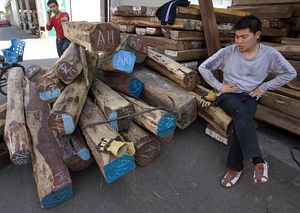This summer, my country, Papua New Guinea (PNG), became the newest member of China’s Belt and Road Initiative. This global program already spans dozens of countries and represents over a trillion dollars of planned investments in infrastructure development. Meanwhile, China’s aid to PNG is surging: only recently, it committed around $4 billion to developing PNG’s national road network. These initiatives mean that bilateral trade is set to increase — but if China does not make significant changes in the way it sources raw materials abroad, the outcome is likely to be a bad one for PNG.
PNG’s forests are among our most valuable natural resources. Some 70 percent of the country is covered in forests that support hundreds of rare and endemic species, making PNG a “megabiodiverse” country. These forests are also directly critical to the lives and well-being of most of our people, including the communities in my province. But for decades, we’ve struggled to responsibly manage this vital resource. The PNG forest sector has long been marked by corruption and illegality, making the timber we produce considered “high risk” by independent international groups that monitor this. And we’re losing money on it: the policy think tank the Oakland Institute has estimated that tax evasion in the sector may be costing PNG over $100 million per year.
Despite these problems, PNG exports a lot of timber — over 3 million cubic meters of logs in 2017. Most of that wood is already bought by China, where it is made into commodities like furniture and flooring. Research from the watchdog group Global Witness showed that some of these products are ending up in places like the United States. Although China doesn’t have a law that bans the import of illegal timber, the United States and other major markets like the European Union do, making this trade a risky one for China. In fact, China is falling behind other major economies in not enacting such a law, and continuing to source risky timber from corrupt states around the world.
As the governor of PNG’s Oro Province, where forests have been targeted by logging companies without my consent or that of affected communities, I see many opportunities for our country to learn from China. The Chinese economy is 700 times the size of PNG’s — but 50 years ago, its GDP was not so different from ours today. As China has rapidly developed, it has lifted millions out of extreme poverty, but that development has had profound effects on its environment and the health of its people.
In recent years, the importance of protecting a healthy environment has become apparent in Chinese domestic policy. For example, in 2017, China extended a ban on commercial logging in natural forests to cover the whole of the country. President Xi Jinping has called for Chinese citizens to defend what he called “ecological red lines”: natural areas that are too valuable to exploit. As Xi puts it, “Lucid waters and lush mountains are invaluable assets.”
I couldn’t agree more. The problem is that while China protects its own environment, its behavior abroad is driving environmental devastation in countries like PNG. China has not yet extended its own internal best practices to how it sources raw materials in other countries, which means that illegally produced timber from PNG continues to feed China’s manufacturing sector.
The forests of Papua New Guinea are a source of wealth not just for our people, but for all of humanity. Our forests store huge quantities of carbon, provide freshwater and local climate benefits, and serve as habitat to extraordinary biodiversity. They are also central to the way of life of millions of Papua New Guineans. This means that what China chooses to do impacts us all. I call on China to keep illegal timber out of its markets — and help PNG’s forests remain standing.
Hon. Gary Juffa, MP, is the Governor of Papua New Guinea’s Oro Province and Leader of the People’s Movement for Change Party.

































